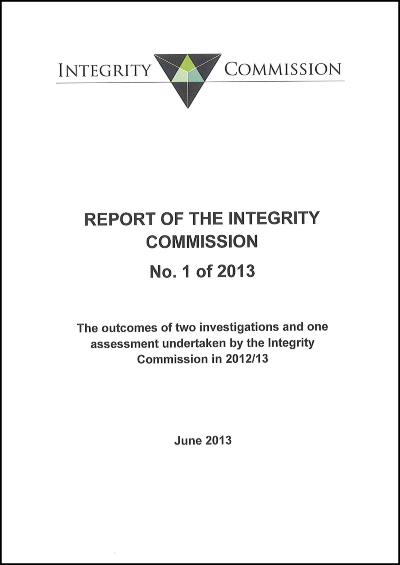Executive summary
One of the ways in which the Integrity Commission is to achieve its objectives is to deal with complaints of misconduct and to make findings and recommendations in relation to its investigations.
The work of the Commission in dealing with complaints is not generally well understood, particularly because of the confidential nature of its assessment or investigation processes. The purpose of this report is to inform stakeholders about the investigative work of the Commission and the outcomes of this work by describing one of the assessments and two of the investigations finalised in 2012/13, on a de-identified basis. The assessment and both investigations were conducted in private in accordance with the Integrity Commission Act 2009 (the Act). The assessment and Operation A both arose directly from complaints made to the Commission by the Department of Justice about misconduct with which the Department was already trying to deal, while Operation B is an example of a complaint made anonymously to the Commission.
In the assessment, the Commission was able to use its powers to gather information, which the Department could rely upon to dismiss an employee.
Each of the operations described in this report required considerable resources and time to ensure that the allegations were properly considered and investigated.
Operation A, which was about certain operations of the Risdon Prison Complex, identified systemic and persistent breaches of many policies relating to procurement, stock control, interaction with inmates, declarations of gifts and use of information technology. In referring the report of the investigation to the Secretary of the Department, the Board of the Integrity Commission made a number of recommendations to address the causes of these breaches. The Secretary accepted the recommendations.
Operation B was also complex, primarily because the behaviour of the subject officer had been ongoing for at least 10 years. The complaint alleged that a manager in a remote location had falsified claims for travel and related allowances. While each claim itself was not significant, the aggregation of the suspect claims totalled thousands of dollars. The subject officer resigned shortly after becoming aware of the Commission’s investigation. The principal causes of this situation were a lack of integrity and honesty on the part of the manager and systemic failures in the governance of the manager’s activities. In referring the report of the investigation to the Secretary of the Department, the Board made a number of recommendations to address the failures in governance. The Secretary accepted the recommendations.
Related content: Three Questions for Ethical Decision-Making (PDF, 67.5 KB)

